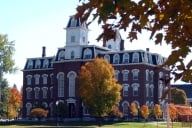You have /5 articles left.
Sign up for a free account or log in.
WASHINGTON -- The U.S. Departments of Education, Health and Human Services and Justice last week sent a letter to medical, dental, nursing and other health professions schools nationwide warning that institutions needed to stop discriminating against applicants or students with Hepatitis B. The letter said that the departments are currently investigating "complaints against medical and dental schools around the country" for violations of the Americans With Disabilities Act.
Not only might medical and dental schools be violating laws barring discrimination based on medical conditions or disability, the letter warns, but they may also be violating Title VI of the Civil Rights Act, which bars discrimination based on race. Title VI may be relevant, the letter states, because while Asians, Native Hawaiians and Pacific Islanders make up less than 5 percent of the U.S. population, they make up about half of the 800,000 to 1.4 million Americans who have Hepatitis B. So discrimination against applicants or students who have Hepatitis B may have a disproportionate impact on members of those groups.
The letter notes that the federal government has already taken action against one institution. In March, the Justice Department announced that it had reached an agreement with the University of Medicine and Dentistry of New Jersey over complaints that its medical school and osteopathic medical school discriminated against students with Hepatitis B. The medical schools revoked the acceptance of students with Hepatitis B, and the Justice Department found this to be illegal discrimination because no requirements of the medical school programs would have created dangers through the participation of students with Hepatitis B. The university agreed to admit the students and to compensate them for what happened.
The federal agencies' letter notes that anti-bias laws "do not require schools of higher education to permit an individual with a disability to participate in particular activities if doing so would pose a direct threat to the health or safety of others." But views of health threats, the letter says, must be "based on a reasonable judgment that relies on current medical knowledge or on the best available objective evidence."
This is where the colleges may be vulnerable. The Centers for Disease Control and Prevention last year issued new guidance on health care workers or students with Hepatitis B. In performing almost all duties that medical or health professions students would perform, the CDC concluded, having Hepatitis B would not pose a risk. The CDC identified only these medical procedures -- most of which aren't performed by medical students -- as posing some risk: "major abdominal, cardiothoracic, and orthopedic surgery, repair of major traumatic injuries, abdominal and vaginal hysterectomy, caesarean section, vaginal deliveries, and major oral or maxillofacial surgery."
While the CDC found insufficient risk to justify bias against health professions students with Hepatitis B, it also found that some applicants with the infection "have had their acceptances to medical or dental schools rescinded or deferred because of their infection."
Geoffrey H. Young, senior director for student affairs and programs at the Association of American Medical Colleges, said that the association was aware of and supportive of last week's letter. "We think it's an important issue," he said.
Young said that AAMC is not aware of which medical colleges are under investigation, but he said that it "could be" that some institutions have not updated policies that were set before last year's CDC guidance. "Medically we have more information now," he said. "There has been an increase in our knowledge."
The Hepatitis B Foundation, which praised last week's letter, published an anonymous essay by a man with Hepatitis B who applied to medical school. In the essay, "Dreams on Hold," he describes turning down one medical school admission offer to accept another, seemingly better one (the institutions are not identified). The medical school deferred his admission after diagnosis, with no assurance he would be subsequently admitted and revoked his scholarship. Not only was he unable to enroll, but he was stuck with a lease he could not cancel on an apartment near the medical school.








